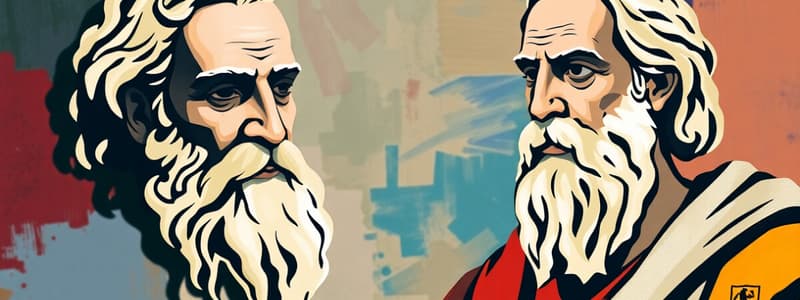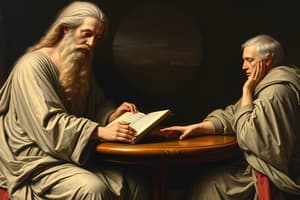Podcast
Questions and Answers
How did witnessing Socrates's trial and execution influence Plato's philosophical pursuits?
How did witnessing Socrates's trial and execution influence Plato's philosophical pursuits?
It motivated Plato to preserve Socrates's legacy and explore deeper questions of justice, virtue, and knowledge through his dialogues.
In what ways did Plato's dialogues, featuring Socrates, facilitate philosophical exploration and critical inquiry, beyond simply presenting conclusions?
In what ways did Plato's dialogues, featuring Socrates, facilitate philosophical exploration and critical inquiry, beyond simply presenting conclusions?
The dialogues present philosophical exploration through debate, modeling critical inquiry and dialectical reasoning, rather than stating conclusions. This allows for examination of different perspectives.
Briefly describe the purpose and significance of Plato's Academy.
Briefly describe the purpose and significance of Plato's Academy.
The Academy, founded by Plato, was one of the first institutions of higher learning in the Western world and served as a center for philosophical and scientific inquiry.
Explain how Plato's aristocratic background and the political turbulence of Athens influenced his political philosophy.
Explain how Plato's aristocratic background and the political turbulence of Athens influenced his political philosophy.
What is the central theme explored in Plato's Republic, and what famous allegory is introduced within it?
What is the central theme explored in Plato's Republic, and what famous allegory is introduced within it?
How do Plato's later dialogues, like Parmenides, differ in their approach and content compared to earlier works like The Republic?
How do Plato's later dialogues, like Parmenides, differ in their approach and content compared to earlier works like The Republic?
Briefly define Plato's Theory of Forms (or Ideas) and explain its significance to his overall philosophy.
Briefly define Plato's Theory of Forms (or Ideas) and explain its significance to his overall philosophy.
Explain how Plato uses the character of Socrates in his dialogues to advance his own philosophical ideas.
Explain how Plato uses the character of Socrates in his dialogues to advance his own philosophical ideas.
How does Plato distinguish between episteme and doxa, and why is this distinction important in his epistemology?
How does Plato distinguish between episteme and doxa, and why is this distinction important in his epistemology?
Explain how Plato's Allegory of the Cave illustrates his views on knowledge, reality, and the role of the philosopher.
Explain how Plato's Allegory of the Cave illustrates his views on knowledge, reality, and the role of the philosopher.
Describe the tripartite structure of Plato's ideal state as outlined in The Republic, and explain how each part corresponds to elements within the individual.
Describe the tripartite structure of Plato's ideal state as outlined in The Republic, and explain how each part corresponds to elements within the individual.
What is Plato's critique of democracy, and what alternative form of governance did he propose in The Republic?
What is Plato's critique of democracy, and what alternative form of governance did he propose in The Republic?
Explain Plato's concept of Forms. Use the example of 'beauty' or 'justice' and explain how particular instances of these concepts in the world relate to their ideal Forms.
Explain Plato's concept of Forms. Use the example of 'beauty' or 'justice' and explain how particular instances of these concepts in the world relate to their ideal Forms.
How does Plato's dualistic view of reality influence his arguments about the immortality of the soul?
How does Plato's dualistic view of reality influence his arguments about the immortality of the soul?
Describe Plato's dialectical method and explain its purpose in philosophical inquiry.
Describe Plato's dialectical method and explain its purpose in philosophical inquiry.
In what ways did the Academy, founded by Plato, contribute to the development of educational institutions and the pursuit of wisdom?
In what ways did the Academy, founded by Plato, contribute to the development of educational institutions and the pursuit of wisdom?
Explain how Plato uses myths and allegories, such as the Myth of Er, to convey philosophical insights. Why might he have chosen these methods rather than purely logical arguments?
Explain how Plato uses myths and allegories, such as the Myth of Er, to convey philosophical insights. Why might he have chosen these methods rather than purely logical arguments?
Identify two specific fields outside of philosophy that have been significantly influenced by Plato's ideas, and briefly explain the nature of his impact in those fields.
Identify two specific fields outside of philosophy that have been significantly influenced by Plato's ideas, and briefly explain the nature of his impact in those fields.
Flashcards
Who was Plato?
Who was Plato?
A Greek philosopher (428/427-348/347 BCE) whose dialogues preserve Socrates' ideas and explore ethics, metaphysics, epistemology, politics, and aesthetics.
Socratic Method
Socratic Method
A method of philosophical inquiry involving dialogue and questioning to explore complex ideas.
Plato's Academy
Plato's Academy
An institution of higher learning founded by Plato in Athens around 387 BCE, which became a center for philosophical and scientific inquiry.
Plato's Dialogues
Plato's Dialogues
Signup and view all the flashcards
"The Republic"
"The Republic"
Signup and view all the flashcards
"Phaedo"
"Phaedo"
Signup and view all the flashcards
"Symposium"
"Symposium"
Signup and view all the flashcards
"Timaeus"
"Timaeus"
Signup and view all the flashcards
Plato's 'Appearance'
Plato's 'Appearance'
Signup and view all the flashcards
Plato's Forms
Plato's Forms
Signup and view all the flashcards
Knowledge vs. Opinion
Knowledge vs. Opinion
Signup and view all the flashcards
Allegory of the Cave
Allegory of the Cave
Signup and view all the flashcards
Philosopher-King
Philosopher-King
Signup and view all the flashcards
Tripartite Society
Tripartite Society
Signup and view all the flashcards
Plato's Dualism
Plato's Dualism
Signup and view all the flashcards
Immortality of the Soul
Immortality of the Soul
Signup and view all the flashcards
Dialectical Method
Dialectical Method
Signup and view all the flashcards
Study Notes
- Plato is a major Western philosopher whose ideas have significantly impacted ethics, metaphysics, epistemology, politics, and aesthetics.
- His works, primarily dialogues, preserve Socrates' ideas and introduce philosophical debates still relevant today.
Historical Context and Biography
- Born around 428/427 BCE in Athens to an aristocratic family.
- Experienced political turmoil- Athenian democracy that later influenced his political philosophy.
- Socrates deeply influenced Plato.
- Plato aimed to preserve Socrates’ legacy after witnessing his trial and execution, exploring justice, virtue, and knowledge.
- Plato founded the Academy in Athens around 387 BCE, one of the first Western higher learning institutions.
Literary Contributions: Dialogues and Style
- Plato’s philosophical writings are dialogues that explore complex ideas through debate, often featuring Socrates.
- This method conveys philosophical content and models critical inquiry and dialectical reasoning.
- Major works include:
- The Republic: Explores justice, the ideal state, the philosopher-king, and includes the Allegory of the Cave.
- Phaedo: Discusses the immortality of the soul and the afterlife.
- Symposium: Examines love and beauty.
- Timaeus: Gives an early account of cosmology and the physical world.
- Parmenides and later dialogues: Complex works probing the nature of forms and human understanding limits.
Core Philosophical Ideas
The Theory of Forms (Ideas)
- Plato believed the sensory world reflects a higher, unchanging reality of Forms, which are eternal, perfect archetypes.
- Examples: multiple beautiful objects relate to a single Form of Beauty, ideals like justice have Forms that serve as benchmarks.
Epistemology: Knowledge vs. Opinion
- Plato distinguished between episteme (true knowledge) and doxa (opinion).
- Genuine knowledge is innate and recollected, not from sensory experience.
- The Allegory of the Cave illustrates the philosopher’s journey from ignorance to understanding truth.
- Prisoners mistake shadows for reality, representing ignorance and the philosopher's enlightenment.
Political Philosophy and the Ideal State
- Plato’s Republic envisions an ideal state ruled by philosopher-kings, wise leaders who know the Form of the Good.
- Society has a tripartite structure:
- Reason: Philosopher-kings.
- Spirited Element: Auxiliaries/warriors.
- Appetitive Element: The producing class.
- Plato critiqued democracy due to its instability, favoring a merit-based, hierarchical governance system.
Metaphysics and the Nature of Reality
- Plato views reality dualistically: the sensible world versus the intelligible realm.
- Dualism questions what it means to be real and if perceptions capture essence.
- Plato argues in Phaedo that the soul is immortal, existing before birth/after death, and seeks knowledge to return to the Forms.
Methodology and Philosophical Approach
- Plato used dialogue, questioning to reveal truths, known as the Socratic method.
- Myths and allegories convey philosophical insights, such as the Myth of Er, in an accessible way.
Legacy and Influence
- Plato’s ideas have influenced political theory, education, literature, and science.
- Platonism was developed later, reinterpreting Plato’s ideas about reality and the soul.
- The Academy institutionalized wisdom pursuit, modeling future universities.
- Plato’s works spark ongoing debates about his ideal state, Forms, and limits of knowledge.
Concluding Thoughts
- Plato's profound contribution is undeniable.
- His exploration of ideas and literary style have shaped intellectual tradition.
- Engaging with Plato confronts fundamental aspects of truth, justice, and reality.
- Studying Plato means embarking on philosophical inquiry, understanding ourselves and the surrounding world.
Studying That Suits You
Use AI to generate personalized quizzes and flashcards to suit your learning preferences.




